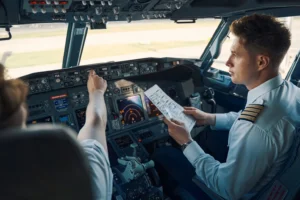Becoming a commercial pilot is a dream for many, but it requires passing a series of challenging exams. The pilot written exam, conducted by the Directorate General of Civil Aviation (DGCA) in India, is one of the crucial steps in this journey. Each year, thousands of aspiring pilots prepare rigorously to achieve their goals.
In 2023 alone, over 5,000 candidates took the DGCA exams, but only about 50% passed on their first attempt. This statistic highlights the need for effective preparation and study strategies.
In this article, we’ll share some practical tips and proven strategies to help you pass the pilot written exam with flying colors. Whether you’re a first-time test-taker or looking to improve your scores, these insights will guide you toward success.
Understanding the importance of DGCA Exam for pilots
To become a commercial pilot in India, you must pass the DGCA (Civil Aviation Directorate) exam. This exam is very important because it shows that you understand and can apply key aviation concepts. Studying the topics in the DGCA syllabus and getting proper flight training from a good flight school are crucial steps.
This combination of knowledge and practical training helps you do well on the exam and prepares you for a safe career in the aviation industry. Scoring high on the DGCA Pilot Exam proves that you are ready for the challenges of being a commercial pilot. The exam is tough, so having a strong grasp of the material and good flight training is essential.
Passing this exam not only gets you a commercial pilot license but also opens up many opportunities in the growing Indian aviation sector. With hard work and proper preparation, you can achieve your dream of becoming a commercial pilot.
Eligibility for DGCA exam
To be eligible for a Commercial Pilot License (CPL) in India, you need to have passed the 12th grade with physics and math and be at least 17 years old. First, you must apply for a computer number through the DGCA Pariksha portal. Once you receive your computer number, you can register for the exams during any exam session. The fee for each exam is Rs. 2500. The CPL exam consists of five subjects: Air Regulations, Aviation Meteorology, Air Navigation, Technical General, and Technical Specific. You need to score at least 70% to pass, and there are no grace marks. The exams are computer-based, multiple-choice, and conducted at designated centers with no negative marking.

For a Private Pilot License (PPL), the eligibility criteria are slightly different. You need to have passed the 10th grade and be at least 16 years old. Similar to the CPL process, you must apply for a computer number on the DGCA Pariksha portal. Once you have this number, you can register for the exams, which also cost Rs. 2500 per exam. The PPL exam includes three subjects: Composite (which covers multiple subjects), Technical General, and Technical Specific. A passing score of 70% is required, with no grace marks. These exams are also computer-based, multiple-choice, and conducted at designated centers with no negative marking
Subjects for DGCA Exam
- Air Navigation
- Aviation Metrology
- Air Regulation
- Technical General
- Technical Specific
- RTR
1. Air Navigation
The Air Navigation exam, worth 100 marks, includes 100 questions, each carrying 1 mark. A passing score is 70 marks, requiring at least 70 correct answers. Navigation Computers and Scientific Calculators without multiple memory are allowed. The syllabus covers:
- General Navigation: Basics of navigation, time conversions, units of measurement, magnetism, compasses, charts, and dead reckoning navigation.
- In-flight Navigation: Navigation during different flight phases, airspeed, wind speed, ground speed, and estimated time of arrival (ETA) adjustments.
- Mass and Balance: Basic terms like Centre of Gravity (CG), loading, aircraft mass limits, stability, and the effects of overloading.
- Flight Planning and Monitoring: Requirements for flight planning, fuel calculations, ground speed, actual fuel consumption, and ICAO ATC flight plan components.
- Radio Navigation: Usage of radio aids like ADF (NDB), VOR, DME, ILS, SSR, GPS/GLONASS.
- Instrument Navigation: Pilot instruments, their principles of operation, gyroscopic properties, and interpretation of various gauges.
2. Aviation Meteorology
This 100-mark exam consists of 50 questions, each worth 2 marks. To pass, at least 35 questions must be correct. The syllabus includes:
- The Atmosphere: Composition, temperature distribution, lapse rate, pressure distribution, altimetry, air density, and the International Standard Atmosphere (ISA).
- Wind: Measurement, causes, turbulence, local winds, and standing waves.
- Thermodynamics: Humidity, dewpoint, and relative humidity.
- Clouds and Fog: Cloud formation, types of clouds, types of fog, and their properties.
- Precipitation: Types of precipitation and associated clouds.
- Air Masses and Fronts: Types of air masses, fronts, occlusions, and their weather impacts.
- Pressure Systems: Cyclones, anticyclones, ridges, troughs, and wedges.
- Climatology: Indian climatology, seasons, winds, pressure distribution, and weather patterns.
- Flight Hazards: Icing, turbulence, windshear, thunderstorms, inversions, visibility issues, and flying in mountainous areas.
- Meteorological Information: Observation types, weather charts, METARs, TAF, SPECI, and SIGMET.
3. Air Regulation
The Air Regulation exam, also 100 marks with 50 questions worth 2 marks each, requires at least 35 correct answers to pass. The syllabus covers:
- Air Regulations: International agreements, DGCA annexures, air navigation rules, air traffic services, and aeronautical information services.
- Human Performance and Limitations: Human limitations, proficiency, professionalism, flight safety, gas laws, oxygen requirements, spatial disorientation, and cockpit automation.
- Operational Procedures: Special and emergency procedures, FDTL, minimum crew requirements, equipment for low visibility operations, and handling dangerous goods.

4. Technical General
This 100-mark exam includes 100 questions, with a passing score of 70 marks. The syllabus covers the aerodynamics and systems of an aircraft:
- Aircraft Structure: Wings, flight controls, stability, propellers, lift, drag, weight, thrust, and flight concepts.
- Aircraft Systems: Fuel system, electrical system, landing gears, air conditioning, and pressure systems.
- Engines: Working and construction of jet and piston engines.
5. Technical Specific
Similar to the Technical General exam, but focusing on a specific aircraft model. The questions relate directly to the specific systems and operations of the designated aircraft.
6. RTR (Radio Telephony Restricted Aero mobile)
The RTR exam is crucial for pilots to operate aircraft radio equipment and communicate effectively with air traffic control and other aircraft. The syllabus includes:
- Radio Procedures: Proper use of radio communication protocols, understanding and using correct phraseology.
- Regulations: Knowledge of national and international regulations governing radio communications in aviation.
- Practical Communication Skills: Handling real-time communication scenarios, understanding and responding to ATC instructions, and managing in-flight communication.
Tips to prepare for written exam
1. Master the DGCA Syllabus:
Before diving into your DGCA exam preparation, ensure you have a thorough understanding of the syllabus. The DGCA provides detailed syllabi for each examination, which you should study meticulously. Familiarize yourself with the subject matter, the weightage of different topics, and the exam format. This foundational knowledge will guide your entire preparation process.

2. Design a Comprehensive Study Plan:
With a clear understanding of the syllabus, create a well-structured study plan. This plan should systematically cover all topics and allocate sufficient time for each. Break your study sessions into manageable chunks, set daily or weekly goals, and adhere to your schedule diligently. Consistent and disciplined study habits will help you cover the entire syllabus effectively.
3. Select High-Quality Study Resources:
It’s crucial to choose the right study materials. Invest in reputable textbooks, reference guides, and online resources that align with the DGCA syllabus. Many aviation schools offer specialized DGCA & RTR Preparation Courses that can be immensely beneficial. Seek recommendations from fellow aspirants or mentors to identify the best resources and ensure you’re studying the correct material.
4. Emphasize on Practice:
Practicing extensively is key to mastering the DGCA exams, which often involve complex problems and scenarios. Solve sample papers, previous years’ question papers, and participate in mock tests. This practice helps you get familiar with the exam format and enhances your problem-solving skills under time constraints.
5. Keep Abreast of Regulatory Updates:
Aviation regulations frequently change, and it’s important to stay updated with the latest DGCA regulations and amendments. Follow aviation news, join forums or discussion groups, and consider subscribing to DGCA newsletters or publications. Being informed about recent changes is crucial for both the written exams and interviews.
6. Leverage Peer Study Groups:
Studying with peers can be highly beneficial. Joining or forming a DGCA study group allows you to discuss complex topics, share insights, and gain different perspectives. Explaining concepts to others can reinforce your understanding, and your peers can assist you with difficult topics. Collaborative learning can significantly enhance your preparation.
7. Maintain Health and Manage Stress:
Your physical and mental well-being are critical for success. Ensure you have a balanced diet, regular exercise, and adequate sleep. Managing stress is equally important; techniques like meditation, yoga, or other relaxation methods can help you stay calm during preparation. A healthy body and mind are essential for optimal performance.
8. Regularly Review and Revise:
Don’t leave revision until the last minute. Regularly review what you’ve learned to reinforce your knowledge. Create concise notes, flashcards, or mind maps for quick revisions. A structured revision strategy can make a significant difference in the final weeks before your DGCA exams, ensuring you retain key information.
9. Subject wise preparation tips
- Air Navigation: Focus on understanding the basics of navigation, time conversions, and the use of navigation computers. Practice calculating airspeed, ground speed, and aircraft positions using navigation tools like the CX3. Regularly solve numericals to build confidence in handling complex navigation scenarios.
- Aviation Meteorology: Study the composition and properties of the atmosphere, weather patterns, and pressure systems. Pay special attention to topics like wind, clouds, and flight hazards. Use visual aids like weather charts and maps to better understand meteorological phenomena and their impact on flight operations.
- Air Regulation: Familiarize yourself with international conventions, DGCA annexures, and air navigation rules. Focus on understanding human performance limitations, operational procedures, and emergency protocols. Keep updated with the latest regulatory changes and amendments to ensure compliance with current standards.
- Technical General: Develop a solid understanding of aircraft aerodynamics, structures, and systems. Study the principles of flight, engine mechanics, and the functioning of various aircraft components. Practical knowledge and understanding of these concepts are crucial for both the exams and real-world applications.
- Technical Specific: Concentrate on the specific systems and operations of the designated aircraft model. Study the aircraft’s manual thoroughly and understand the intricacies of its operations. Regularly practice with aircraft-specific scenarios and problems to build a strong foundation in technical knowledge.
- RTR (Radio Telephony Restricted Aero mobile): Focus on mastering radio communication protocols, correct phraseology, and regulatory requirements. Practice handling real-time communication scenarios and familiarize yourself with ATC instructions. Effective communication skills are vital for ensuring flight safety and efficient air traffic management.

Conclusion
In conclusion, passing the pilot written exam is a challenging but achievable goal. With a clear understanding of the syllabus, a well-structured study plan, the right study materials, and regular practice, you can greatly improve your chances of success. Stay updated with the latest regulations, join study groups, and take care of your health to ensure you’re in the best shape for the exam. Remember, consistent effort and smart preparation are the keys to passing the DGCA exam and moving closer to your dream of becoming a commercial pilot. Good luck!
FAQ
How long does it take to prepare for the pilot written exam?
The duration of preparation varies depending on individual study habits and prior knowledge. On average, candidates spend anywhere from three to six months preparing for the pilot written exam.
Can I retake the pilot written exam if I fail the first time?
Yes, candidates are allowed to retake the exam. If you fail then you have to wait for 42 days cooling period you can attempt it again, so it’s essential to use this time for further preparation.
What happens if I pass the written exam but fail the practical flight test?
Passing the written exam is just one step in the process of becoming a pilot. If you fail the practical flight test, you’ll need to undergo additional training and practice before retaking the test.
